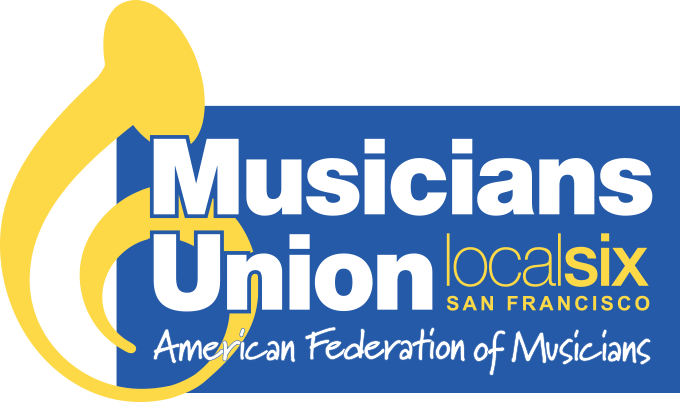Member Profile: David Sprung – The Opposite Man
by Alex Walsh
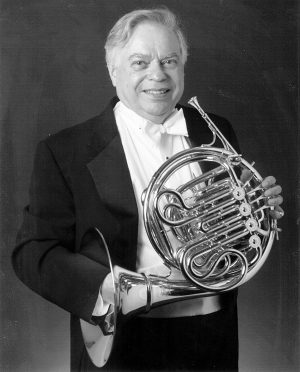 David Sprung calls himself “The Opposite Man” because somewhere back in elementary school he skipped a half grade. “That’s what they used to do with what they considered bright kids. So I was always in-between—opposite. When I went to Queens College I started in January.”
David Sprung calls himself “The Opposite Man” because somewhere back in elementary school he skipped a half grade. “That’s what they used to do with what they considered bright kids. So I was always in-between—opposite. When I went to Queens College I started in January.”
For his career, he had planned to become a college professor and did so, but performing as a professional musician was always a parallel career. Retiring from teaching in 1992, David has continued to perform. “That’s not the way it’s supposed to go,” he says,” you’re supposed to retire from performing and then teach. I did the opposite.”
David was born in 1931. He was raised in New York City, mostly in Rego Park, Queens. “It wasn’t until years later that I found out I was born in New Jersey—another opposite. I was surprised that no one told me.” With three older sisters, he was considered the baby of the family. His father was a small business man. As a child, he remembers wanting to play the violin, but found himself in a clarinet class in elementary school. Actually, he says he knew so little about music at the time that he had confused “clarinet” with “cornet” and was just too shy to protest when he found that it wasn’t a brass instrument, so he just went along with it for three years. “No one in my immediate family was a musician, although my father’s side of the family were talented amateur artists and my mother had a strikingly beautiful untrained voice.” A cousin, Roger Sprung, is a well-known blue-grass banjo player; another cousin, Barbara Sprung Wilkes is a talented pianist and a nephew, Alan Menken, is the famous Oscar-winning Disney composer of films such as Pocohontas, Beauty and the Beast, Aladdin and The Hunchback of Notre Dame.
In high school, David finally got the courage to tell his parents that he really wanted to play the trumpet. He began taking trumpet lessons from Lorenzo Sansone, a well-known horn teacher, who happened to be a client of his father’s accountant. (Just so you know – “Horn” means “French Horn”.) Mr. Sansone had been a renowned horn player, by then retired, and had successfully branched out into designing and manufacturing instruments, as well as publishing music. He also taught horn and made horns for the military during WWII. When David’s high school music teachers heard that he was taking trumpet lessons from Mr. Sansone, they asked him why he wasn’t taking horn lessons. “I was indifferent to their suggestions – I barely knew what a French horn was”. But they kept working on me – they had lots of trumpet players but few horn players, and at an open school night they said to my parents, ‘You know, if David takes up the horn, we can almost guarantee he’ll get a scholarship to college.’ That was music to their ears, so my parents said, ‘David, why don’t you take up the horn?’ So they bought a horn from Mr. Sansone, and he began giving me lessons.” After a couple of years with Mr. Sansone, David went to a new teacher, Robert Schulze, retired fourth horn of the New York Philharmonic, who was then an adjunct at the Manhattan School of Music. ”Schulze had me sign up for lessons at the Manhattan School because they partially subsidized the lesson fee, but I never attended any classes nor graduated from there. But, to this day, for some reason, the Manhattan School of Music considers me an alumnus.”
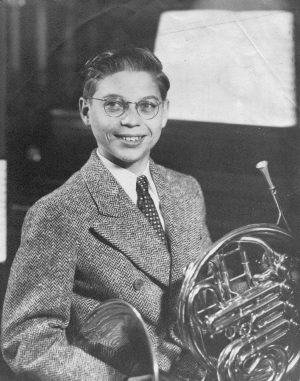
David attended Stuyvesant High School, which is well known as a school that specialized in science education. David had always loved science and had thought that would be his career path. But he progressed very rapidly on the horn, quickly joining the high school orchestra. After six months of lessons, he got into the All-City High School Orchestra and was playing in numerous community orchestras. He joined Local 802 in 1946 at age 15. In his senior year, he applied to the University of Michigan as a bio-chemistry major, but was turned down. When his high school music teachers suggested to the University that they were losing a great horn player, they took a second look. “But by that time I had decided to go to Queens College, which was tuition-free and an excellent liberal arts school.” He lived at home and immersed himself in his studies.
In 1951, after his second year in college, the Korean War started, and to avoid the draft, he enlisted in the Navy. He went to the Navy School of Music in Washington, D.C. for nine months, then on to the Naval Training Center Band in San Diego. It was a large concert band that mostly played dress parades and ceremonials for graduating recruits and an occasional concert. Having lots of time on his hands, he practiced the horn, played in a youth orchestra, and, starved for good musical experiences, auditioned and joined a chorus organized one summer for Robert Shaw, who was in town for a special choral festival. “I remember singing bass (badly) in the chorus and participating in rehearsals and performances of Beethoven’s Missa Solemnis and Honnegger’s La Roi David accompanied by the San Diego Symphony. What a thrill!”
After two years, he was sent to the Far East, where he played in Unit Band 149, which was attached to the 7th Fleet and served as the admiral’s personal band. “These fleet bands were 17-piece groups that would play everything from marches and parades to concerts and dances. Why they needed a French horn, I have no idea. The sailors appreciated big band music, and sometimes they were short a sax, so I played tenor parts on the horn. It works pretty well.” During that time, the Navy announced a march competition with a first prize of $1,000. “Having lots of time on my hands, I composed a march and submitted it. To my surprise, among the hundreds of marches entered, mine came in second. All I got was a certificate and a hand shake, but it was nice to get the recognition.”
Following his discharge from the Navy in 1955, David returned to Queens College to complete his BA in Music. While at Queens, David became more interested in conducting and composition. “Vittorio Rieti and then Luigi Dallapiccola were guest professors in composition at Queens at the time and I had the privilege of studying with them.” He received a couple of prizes as a result of compositions written under their tutelage. ”I had some really great teachers at Queens, but I did not study horn in school; I studied everything else but horn.” The Queens College Music Department at the time was an academically-oriented environment and had no instrumental instruction. “Now, of course, they have the Aaron Copland School of Music and a full array of applied offerings.” David did continue playing, though, performing in the school orchestra and various community and semi-professional orchestras. He finished his undergraduate degree in 1957 with a vague career path connected to conducting in mind. “It was something related to the idea that, there are no American conductors of any repute other than Leonard Bernstein, which was true at the time, so I thought what I should do is get a good liberal arts degree, and a master’s degree, and teach college somewhere. I liked the Queens College model. So for graduate school I applied to Princeton as a composition major because I thought composing would be a good way to get the skills to be a conductor. The conductor waving his arms is trivial; what’s really important is to understand music, understand the notes, what’s inside the notes—orchestration, form, style, music history. Those are the things you learn in a liberal arts education environment.”
In 1957 he was accepted to Princeton as a composition major under the G.I. Bill. At Princeton, he studied with Roger Sessions and Milton Babbitt. He also played principal horn in the Princeton Symphony. During his second year, he received a fellowship, which paid for the rest of his degree. About this time, he had a life changing encounter. He had just read “The Art of French Horn Playing” by Philip Farkas, a renowned horn pedagogue, and principal horn for the Chicago Symphony. “I wrote him a letter, just cold turkey. I said, ‘I know you tour with the Chicago Symphony, and I’d love to take a lesson with you when you’re near New York or New Jersey.’ He wrote me back and said yes. In that one lesson, he corrected my embouchure deficiency, and transformed my playing. It gave me a much better sound and much more flexibility. To this day, I think I can still play at the age of 80 due to that initial instruction from Philip Farkas.”
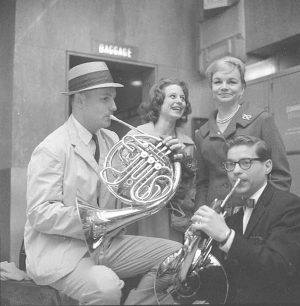
On tour with the Metropolitan Opera, 1960.
Princeton had promised David that they would get him a placement after graduation, but teaching jobs were tight at the time, so he returned to New York and taught part time at Queens College and City College. He also free-lanced as a horn player, finding work in The Orchestra of America, and the Symphony of the Air (previously the NBC Symphony) and a few other engagements. At the end of that year he auditioned and got into the Royal Ballet Orchestra as principal horn, which was traveling for twenty weeks in the US. He also took an audition for the New York Metropolitan Opera Orchestra, and won. “In those days, they did not advertise in the International Musician; it was all word of mouth. But as a freelancer I found out about it.” He was able to find a sub to get out of his touring contract, and began playing for the Met as a 2nd and/or 3rd horn in 1960.
David enjoyed playing at the Met, but really wanted to be a first horn player. His colleague, Richard Moore, told him the Pittsburgh Symphony was auditioning for a first horn. David auditioned and was accepted for the season beginning in the Autumn of 1961. It was a short, twenty-eight-week season, packed with concerts and tours. “We toured on the Greyhound Bus. I learned a lot, but I wasn’t happy doing it on a long-term basis. It was just too busy and hectic. After the first season, I packed up my wife and child and returned to New York before returning for a second season the following Fall, and then resigned.”
He returned to his plan of getting a college teaching job. With the help of a music teacher placement service, he found a job as Assistant Professor of Horn and Theory at the University of Wichita, in Kansas. He taught horn and music theory, but was soon dissatisfied there because, while he enjoyed teaching, the general academic environment was not what he expected nor was accustomed to. After three years, he called Princeton again, and they told him there were opportunities in California, which was expanding its university system at the time. He took a post at Sonoma State College, a brand new school that was starting a music department. “Fred Warren was the chairman. He was less impressed by the fact that I graduated with honors from Queens, and got a Fellowship at Princeton, but for some reason he really liked the idea that I had gone to Stuyvesant High School.” It was 1966. He moved to Novato with his second wife, Gail, and began teaching theory and composition and tried to organize a community orchestra at Sonoma State. “That was difficult because the Santa Rosa Symphony, then itself a community orchestra, seemed to feel threatened as I saw it, although I did end up playing with them from time to time.” He also began subbing with the San Francisco Opera Orchestra and the San Francisco and Oakland Symphonies, but found that the school was somewhat skeptical of his outside activities due to some scheduling conflicts.
“By that time, 1970, California State University, Hayward, as it was known then, was building a big applied music department, and wanted a full time horn professor. I was offered that job, and took it, so we moved from Marin County to the East Bay. I taught at Hayward from 1970 to 1992.”
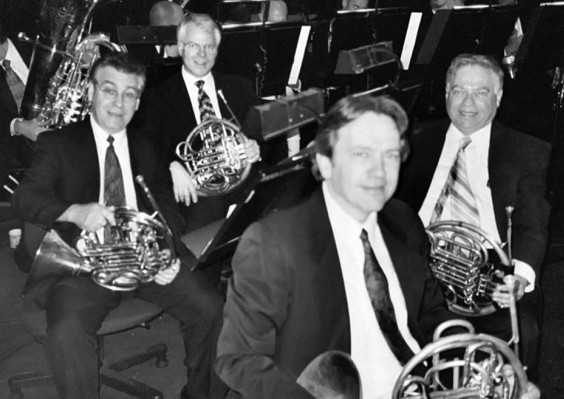
The SF Ballet horn section: (l-r) Bill Klingelhoffer,
Brian McCarty, Keith Green and David Sprung.
In 1973, he got into the San Francisco Opera Orchestra full-time as co-principal horn. The Opera had a fall-only season at the time. In 1975, the San Francisco Ballet decided they wanted their own regular orchestra and he became principal horn of that, as well as the Opera, while still teaching at Cal State. By then, Gail and he also had two kids. “It was a lot of juggling.”
Sometime during the ‘80s, David decided to ask for partial leave from teaching so he could concentrate more on performing. He taught half-time and continued to play in the Opera and Ballet Orchestras, and on freelance gigs, including recording sessions at Skywalker Ranch. His nephew, Alan Menken, invited him to play some of his film dates in Los Angeles.
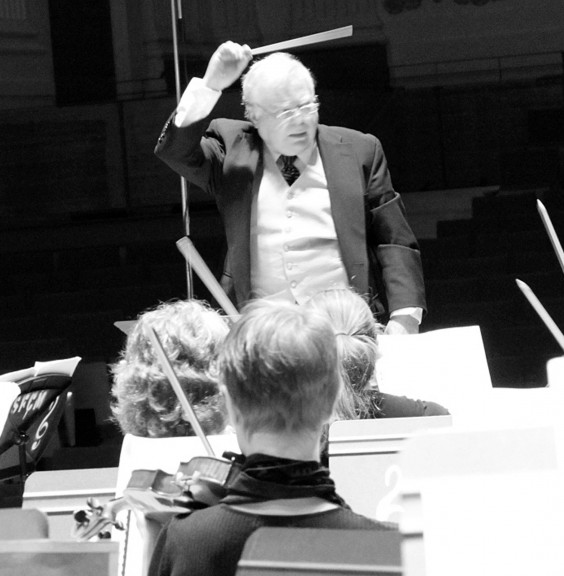
David Sprung Conducting Symphony Parnassus
in his Fantasy Variations
“I still wanted to be a conductor, but I didn’t know how to promote myself for that. I did conduct a couple of years at the Bohemian Club.” In 2000, he decided to go for it. He retired from the Ballet Orchestra, took a leave of absence from the Opera Orchestra, and moved to Florida to start an orchestra. “We bought a house in Palm Coast, Florida and started the Flagler Symphony, near Daytona Beach, so I could conduct. It required funds to be raised, and it was difficult. It went on for two years as a regular orchestra, then for two years as a weekend festival. I made sure it was a union orchestra.”
After two years, he began commuting coast-to-coast, coming back for the opera season and returning to Florida the rest of the year. In 2004, the Sprungs returned to the Bay Area permanently and David retired from the Opera Orchestra in 2008. Today, he continues to compose and freelance. He has played principal horn with the Midsummer Mozart Festival since 2005. Last week, he played with the Symphony Silicon Valley.
In retirement, he has resurrected pieces he composed while at Princeton and Queens College and is working on new material, including solo piano pieces, a horn quartet, and a choral work. “Eventually, I hope to work on larger pieces for orchestra, and who knows, maybe even an opera.” He recently had compositions performed by the Symphony Parnassus and the San Francisco Composers Chamber Orchestra.
David says that he’s a big fan of the union. “Both the Ballet and Opera paid in to the AFM-EP over the years and created a great pension for me, which makes my current endeavors viable.”
“I’ve lost some good friends and colleagues along the way. That’s the downside of living a long time. But I have a great family, have had a good career, and I have no complaints—I think.” (laughs)
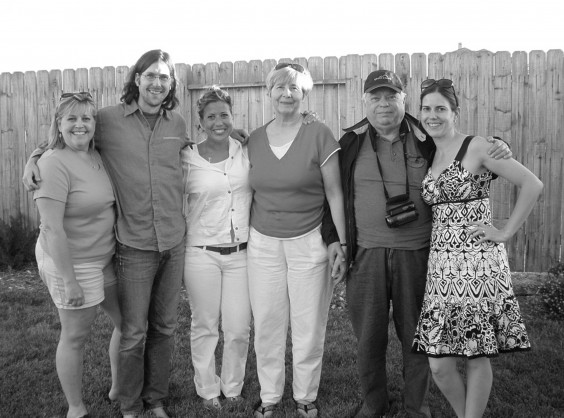
The Sprung family: (l-r) Irene Sprung,
Steven Sprung, Karen Sprung, Gail Sprung,
David Sprung and Audrey Sprung Banks
